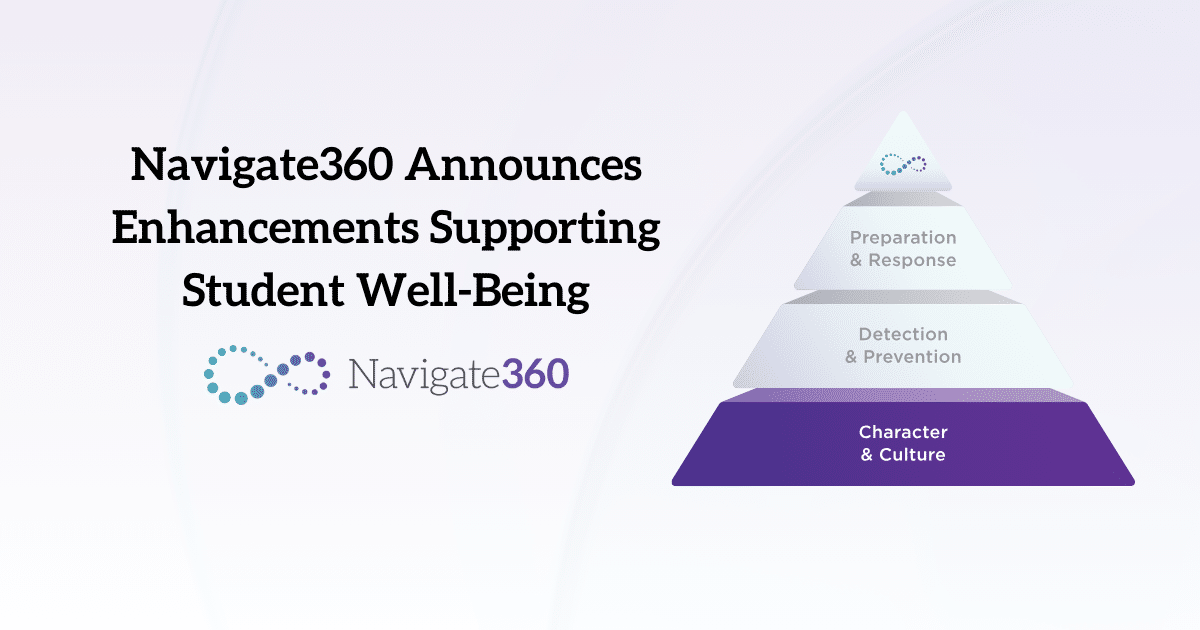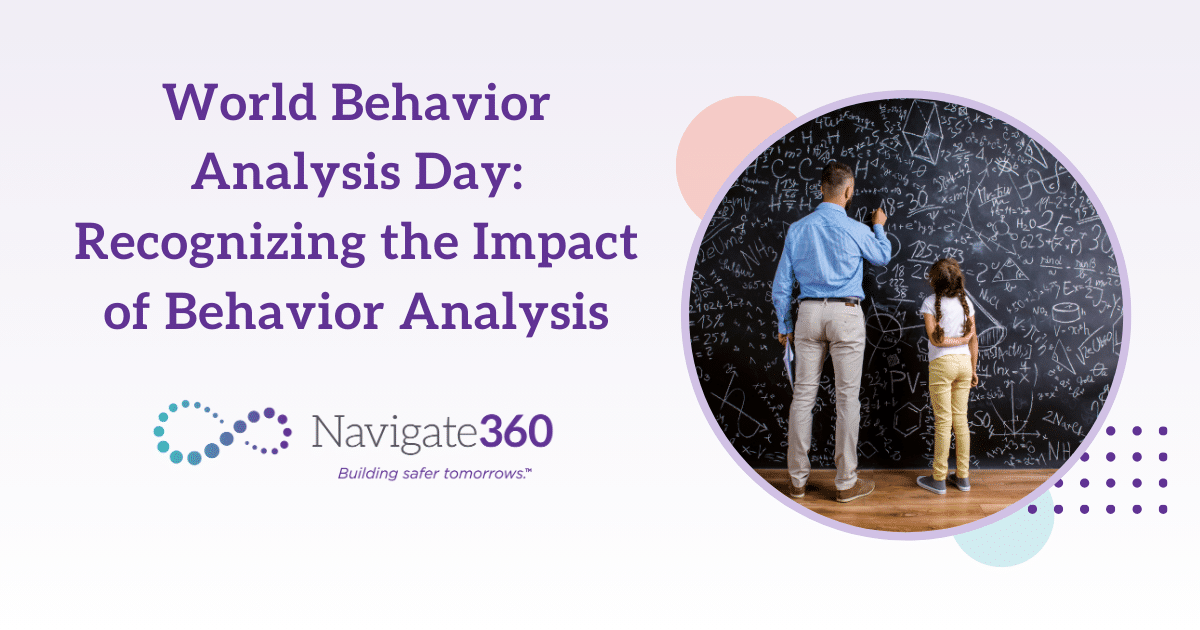Navigate360 – Building Safer Tomorrows™
Exploring SEL Authentically with Socratic Seminars
Want to Learn More about Social-Emotional Learning?
Navigate360 would love to talk to you about our comprehensive approach to social-emotional learning including products and services we offer that can help keep your students, faculty and organization thriving.
Teaching social-emotional learning (SEL) in middle school and high school can seem like a daunting task. While students in this age range need to focus on building their social and emotional skills, they may be reluctant to participate in lessons that seem childish or irrelevant. Students at this stage of development are also quite concerned about how they are viewed by their peers and discussing personal topics that require them to be vulnerable can be a lot to ask. However, there are ways to facilitate rich discussions with your class without the pressure of getting too close for comfort.
One way to engage students in SEL discussions involves using Socratic seminars. You may have heard of such seminars in the context of a language arts class, but this method of learning is also an effective way to integrate SEL into your classrooms. Socratic seminars are student-led discussions designed to deepen understanding of a text through thoughtful inquiry and dialogue. The method is based on the Greek philosopher Socrates’ theory that teaching students to become independent thinkers and construct their own interpretations involves more than simply focusing on finding “right” answers.
Socrates believed in the value of posing questions throughout the learning process as a way to find deeper meaning. Socratic seminars are a great tool for facilitating classroom discussions on SEL topics because students are able to focus on the thoughts, feelings, conflicts and problems that characters within a text are facing. This takes the pressure off of them to share their own experiences, allowing them instead to have relevant conversations about social and emotional topics with less of a perceived social risk.
It’s important to note that Socratic seminars are not without risk, which is why it is crucial to plan ahead for success. To make the most out of your Socratic seminars, consider some of these strategies and best practices in your planning:
- Establish clear and consistent norms and expectations to ensure a safe space for students to share their ideas. Socratic seminars allow students to discuss their interpretations and understanding of a text. There are no right or wrong (or good or bad) ideas. Students are welcome to ask questions to clarify something that a peer said, but they are not to judge or put down anyone’s contributions. One method of ensuring that students are responding in a non-judgmental way and avoiding confrontation is by using “I” statements: For example, “I heard you say . . . Do I have it right?”, “I am curious about . . .”, or “I noticed . . . Can you say more about that?” Students should also be thoughtful about how much they are contributing and give everyone a chance to be heard.
Practicing active listening is another good way to ensure a safe space. Active listening involves listening for understanding. When students use active listening, they are focused on and thinking about what their peers are saying. They paraphrase what they have heard to ensure they understand their peers’ intent and they are not distracted by thinking of their own response. This is also a way to prevent students from interrupting each other because they will be focusing on taking in what the person is saying. Modeling and using guided practice for both “I” statements and active listening before you begin Socratic seminars will help students feel more confident in following expectations. - Pick the right text. There are endless options for choosing a text for a Socratic seminar. If you want to focus on teaching SEL kills, make sure you are choosing a text that has dynamic characters, rich emotional content, multiple perspectives and nuanced communication and includes a problem that requires flexible thinking and multiple solutions. There are many young-adult novels that include all of these components, but there are also shorter texts that focus on just one or two. Students should be able to make connections to CASEL’s framework and the five SEL competencies of self-awareness, self-management, social awareness, relationship skills and responsible decision-making. Good Socratic seminar texts undoubtedly delve into multiple competencies.
More than anything, you’ll want to choose a text that students can relate to and that lends itself to authentic questioning and exploration. Some great novels to explore using Socratic seminars are Fish in a Tree by Linda Mullaly Hunt, Out of My Mind by Sharon M. Draper, Posted by John David Anderson, The Hate You Give by Angie Thomas, Ghost by Jason Reynolds, and Darius the Great Is Not Okay by Adib Khorram.For an example of how to lead a Socratic seminar using Komi Can’t Communicate by Tomohito Oda, click here. - Be thoughtful and intentional with questions. Students should come to a Socratic seminar ready to discuss the assigned reading. They can take notes on what stood out to them in the text or highlight points that they feel are important to help them prepare. The questions asked during a Socratic seminar should be open-ended, have multiple answers and lead to additional questions. Think of questions that will spark deeper exploration of what can be gleaned from the surface of a text. Ask questions that invite students to connect their own experiences to the text and encourage students to ask each other questions. Posting a list of probing questions for students to refer to is a great way to scaffold this. Examples of questions include, “Why do you think that?”, “Can you tell me more about ____?”, “Why is that an important part?”, “What do you mean when you say ____?”, and “Is there another way to think about that?” Once students become skilled with this type of questioning, your role as facilitator can be scaled back further.
- Reinforce student learning with anchor charts. Anchor charts for Socratic seminars can include behavior expectations, key ideas, key vocabulary, sentence starters, probing questions and anything else that is meaningful to your class. One way to get more explicit with teaching SEL concepts is to have an anchor chart for various emotions, skills or concepts that come up during discussions. You could also have an anchor chart for each of the 5 CASEL competencies and have students add vocabulary, ideas and topics to relevant areas of the SEL framework. For example, if a seminar discussion focuses on a character’s strengths and weaknesses, you could add it to an anchor chart for self-awareness. If a discussion focuses on how two characters interact and communicate with each other, you could add it to an anchor chart for relationship skills. There are many ways to use anchor charts for Socratic seminars, and this is by no means an exhaustive list. Get creative with your anchor charts.
- Students are the leaders in this activity. Once you’ve established expectations and norms and students are able to take the reins, let them! Some classes have entirely student-led Socratic seminars. Students should arrange themselves in a circle all sitting at the same level to promote engagement and connection. Some classes choose to sit in a single circle and others choose to configure themselves into two concentric circles that face each other like a fishbowl. In the format of two circles, each circle will take turns discussing their thoughts and questions and offering feedback on the discussion. You, the teacher, can sit outside of the circle to represent that you are there as an observer and a facilitator, not as an active participant or provider of knowledge. Once your class has mastered the basics of Socratic seminars, you can sit back and enjoy the fruits of your labor.
Socratic seminars are a versatile and effective tool for sparking critical thinking about SEL topics and can be integrated across multiple subject areas. Students’ ownership and buy-in are incredibly important for the learning process. Socratic seminars offer opportunities for student-led discussions that organically foster personal investment, engagement, community building, communication skills and a deeper understanding of SEL. With some careful planning and preparation, your students can begin building on and applying not only academic knowledge and skills but also life skills that can contribute to their overall happiness and wellbeing. And isn’t that the epitome of a successful education?

About the Author
Brigette Chauvette
Brigette Chauvette is a senior curriculum manager for Navigate360. She is a former educator who has 12 years of extensive experience with emotional and behavioral differences. Brigette is on a mission to support teachers and students by making SEL an accessible and valued component in all schools.



